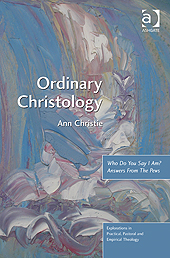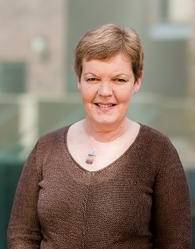Ann Christie: Ordinary Christology
 Ann Christie, Ordinary Christology: Who Do You Say I Am? Answers From The Pews (Ashgate, 2012), 224 pages, ISBN 9781409425359.
Ann Christie, Ordinary Christology: Who Do You Say I Am? Answers From The Pews (Ashgate, 2012), 224 pages, ISBN 9781409425359.
In Matthew 16:16 Jesus asked his disciples, “Who do you say that I am?” Peter gave a direct answer, “You are the Christ, the Son of the living God.” This response remained the traditional answer of the church until the dawn of the Enlightenment in the western world. In our postmodern Christianity, Dr. Ann Christie (Senior Lecturer in Theology and Ministry at York St. John University in the UK) presents an empirical study of Jesus in her book Ordinary Christology. She offers a theological appraisal highlighting the voices and opinions of lay people considering the characteristics of Jesus’ life. Christie, raised a Roman Catholic, eventually involved herself with the evangelical-charismatic renewal and is now a self-proclaimed liberal in her theological perspective (16). Her background as a science teacher (utilizing socio-scientific methods) and broad range of theological experiences furnished her with the opportunity to interview ordinary churchgoers about their beliefs on Jesus and salvation. From her interviews, she identified three christologies; functional, ontological and skeptical. This book review will briefly describe each christological view and how different soteriologies interpret who Jesus and what salvation he provided. I will conclude with an additional element that necessitates consideration in this book.
First, functional christology was the majority sample (30 of 45 interviewees) cross-examined. In this view, Jesus presented himself as an earthly agent of God. Essentially, the respondents believed in an Arian Christianity holding to an absence of the pre-existence of Christ. However, they did not subscribe to the concept that Christ contained two natures, fully God, and human. Second, ontological christology (9 of 45 interviewees) acknowledged that Jesus was fully divine. These persons donned an evangelical theology and read numerous works from academic theologians. Third, skeptical christology (6 of 45 interviewees) believed that Jesus was a good man and rejected a supernatural bodily resurrection or virgin birth.

Ann Christie is Senior Lecturer in Theology at York St John University, York, UK.
Christie also distinguished three soteriologies: exemplarist, traditionalist, and evangelical. First, the exemplarist soteriology recognized the cross of Jesus as a demonstration of God’s love. Second, traditionalist soteriology accepted the standard salvation teachings of the church. Many persons of this view did not question notions of Christ describing his supernatural nature. Third, evangelical soteriology believed in the substitutionary death of Christ on the cross. Many interviewees stated that they experienced a personal relationship with Jesus.
After assessing these results, she noted that the majority of candidates supported a theocentric, rather than a christocentric spirituality. Because Jesus’ divinity is not clearly stated in the gospels, many churchgoers will not subscribe to the Chalcedon testimony of the church concerning Jesus. Consequently, christology is not necessarily about right doctrine but allowing the Jesus’ story to change our piety; therefore, christology should be more about orthopraxy rather than orthodoxy. As Christie commented, “finding out what Jesus means to people is arguably more important than finding out who they think he is” (6). Thus, the author’s empirical findings contain important consequences for pastoral, theological, and missiological significance in the church.
Though Christie utilizes empirical methods to assess these results on christology, her discussion evaluates only what people believed Jesus’ divinity comprised. Yet, I believe Jesus’ humanity was not taken seriously in the interviews. The issue many churchgoers have is that Jesus accomplished what he did because he was God (or not God). However, if she was concerned with orthopraxy, why was no assessment of his humanity with christology mentioned? The scriptures speak of picking up our cross and following him. Jesus called his disciples to be like him. Therefore, a complete orthopraxy would examine the divine identity of Christ made known through an incarnational hermeneutic (John 1:14). Until the Enlightenment, most of church history took Jesus’ divinity for granted at the expense of his humanity. Humankind’s broken and fragmented life has more to do with his humanity than his divinity. Hence, to fully understand how to live, we must understand Jesus’ humanity. I believe Dr. Christie’s Ordinary Christology requires a further study on the human Jesus and interview questions drawing out belief about the humanity of Jesus. In short, a complete look at orthopraxy should include an evaluation of how Jesus’ humanity relates to his divinity, and this is where orthopraxy with orthodoxy can balance out this empirical process.
Reviewed by Cletus L. Hull, III
Category: In Depth, Winter 2016


